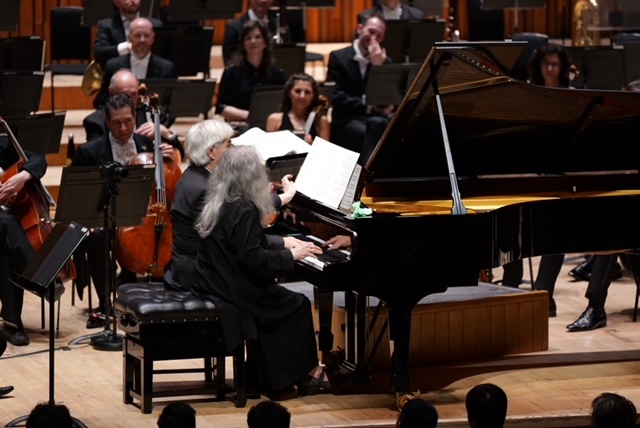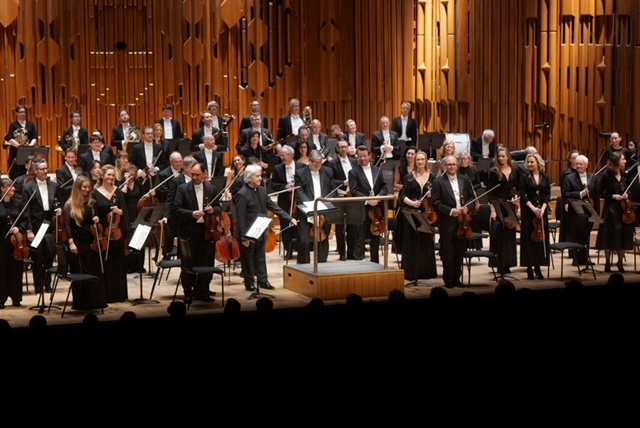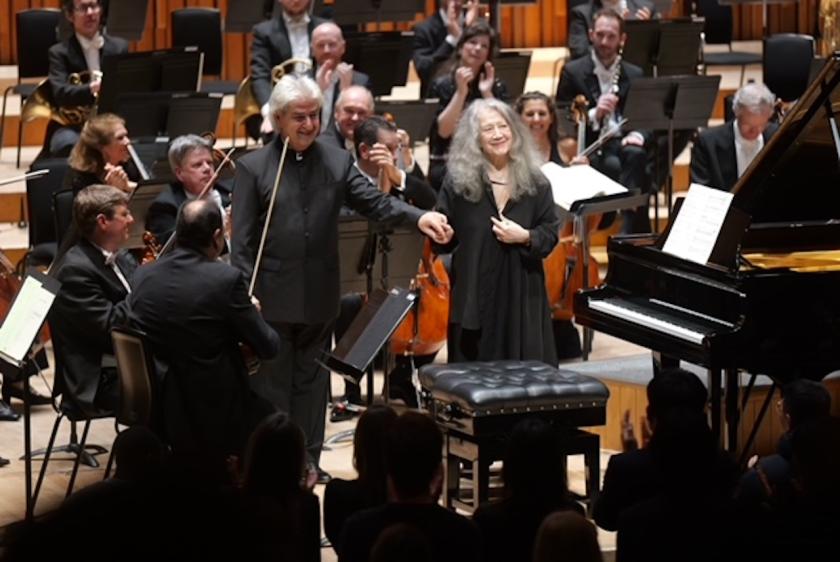At the age of 83, Martha Argerich contains more personality in her little finger than many people do in their entire bodies.
Her vigorous, technically dazzling delivery of Beethoven’s Second Piano Concerto began before she even touched the piano. As the orchestra played the opening passage she wasn’t just swaying in time to the music, she was hunching forward for the diminuendos and mouthing “ba-dum ba-dum ba-dum” along to the dotted rhythms. She couldn’t wait to be part of the performance, and right from the crisp ornamentation of her first entry she was its life and soul.
Argerich has cancelled a number of concerts due to ill health in recent years – including this one, which was initially scheduled for 12 January 2024 – yet there was no whisper of frailty as she played this most Mozartian of Beethoven concertos. Composed by Beethoven to display his virtuosity on the piano when he moved from Bonn to Vienna, it’s as striking for its mercurial shifts in mood as it is for its technical demands. Argerich mapped the fluid twists and turns of the Allegro con brio movement with ease, shifting in a matter of seconds from nimble ornamentation to soulful lyricism to the shimmering gold of the first descending passage.
It didn’t hurt that the conductor for the evening, the Cypriot-born Marios Papadopoulos, is also a pianist who received his ARCM diploma at the age of 14 and has worked as a conductor with musicians including Vladimir Ashkenazy and Nicola Benedetti. The Oxford Philharmonic Orchestra (OPO) that he founded here proved to be a dynamic partner for Argerich’s agile, vivacious performance. Sometimes Argerich has been accused of not paying enough attention to the orchestras she performs with. Yet here, often it felt as if we were eavesdropping on a conversation as she went between force and whimsicality, flinging out some passages almost like a joke and listening with pleasure as the orchestra responded in kind. Though with the rich, initially fugue-like cadenza – a whole odyssey of sound that took us well into the emotional register of later Beethoven works – she made it absolutely clear who was in charge of the debate.
In the second Adagio movement, her cantabile managed simultaneously to convey heartbreak and the iron resolve to transcend it. Beyond this there were moments of extraordinary sublety. At one point the notes seemed to be echoing like bells in the distance as everyone in the auditorium held their breath to hear them. Argerich played with the rapture of someone discovering the notes for the first time, revelling in their quiet mystery.  Then we were into the Molto allegro of the final movement and back in whirlwind mode. There was such a sense of fire and rebellion to Argerich’s energy, it was surprising that she didn’t leap up and conduct the orchestra herself when she wasn’t playing. Though there was no doubting the chemistry between her and Papadopoulos as they beamed at each other towards the conclusion. It was a lovely touch that when it came to Argerich’s encore, rather than keeping the spotlight to herself, she performed a duet from Ravel's Mother Goose suite sparkily partnered by Papadopoulos.
Then we were into the Molto allegro of the final movement and back in whirlwind mode. There was such a sense of fire and rebellion to Argerich’s energy, it was surprising that she didn’t leap up and conduct the orchestra herself when she wasn’t playing. Though there was no doubting the chemistry between her and Papadopoulos as they beamed at each other towards the conclusion. It was a lovely touch that when it came to Argerich’s encore, rather than keeping the spotlight to herself, she performed a duet from Ravel's Mother Goose suite sparkily partnered by Papadopoulos.
The concerto was very much the highlight of an evening that began with Samuel Coleridge-Taylor Ballade in A minor for orchestra. Coleridge-Taylor composed this thanks to an introduction from Elgar to the Three Choirs Festival in 1898 – who wrote to the festival’s organiser “He still wants recognition and he is far and away the cleverest fellow going among the young men”.
It took a little while for the OPO to build a satisfying momentum. We could feel the blustery windswept lyricism of the opening passages followed by the honeyed sweetness of the ballade as it became more expansive, but it all felt strangely muted. It was only about half way through that the performance achieved a compelling grandeur, making it feel as if we were on an ocean liner as the emotion swelled and compressed. The ravishing optimism of the harmonies and the lush orchestration made it seem all the more tragic that Coleridge-Taylor would die in poverty in 1912 at the age of 37.
The evening finished with Tchaikovsky’s Fourth Symphony, the work he famously composed after he had ended his marriage following a breakdown in which he walked into the Moskva river, hoping to contract pneumonia. The tyrannical blast of brass at the opening of the first movement – symbolising, according to the composer himself, the “fateful force which prevents the impulse to happiness from attaining its goal” was delivered with plangent authority. This was swiftly succeeded by the more tentatively orchestrated development in which there was a strong sense of the composer’s agitated state of mind. Though in contrast to Tchaikovsky’s analysis, a sense of humour and energy built through the movement bringing with it the sense of freedom in sight.  There was plenty that pleased here: the sublime agony of the solo oboe at the opening of the second movement and the gorgeous sweep of the strings that succeeded it; the hailstone rapid pizzicato that underpinned the wit and vigour of the third movement. In the final movement – in which the simple theme of a Russian folk song builds in impact through orchestration at full-throttle – the brass section again shone with its ominous overtones, even as the strings and woodwind stampeded towards the assertive conclusion.
There was plenty that pleased here: the sublime agony of the solo oboe at the opening of the second movement and the gorgeous sweep of the strings that succeeded it; the hailstone rapid pizzicato that underpinned the wit and vigour of the third movement. In the final movement – in which the simple theme of a Russian folk song builds in impact through orchestration at full-throttle – the brass section again shone with its ominous overtones, even as the strings and woodwind stampeded towards the assertive conclusion.
Yet despite the convincing tempest of emotion, it was Argerich who really blazed through in this concert. While there was plenty to enjoy throughout, her performance took it to another level. As a critic you witness plenty of faked standing ovations, but there was no doubting the eruption of excitement in the hall. All in all, well worth the wait of more than a year.














Add comment